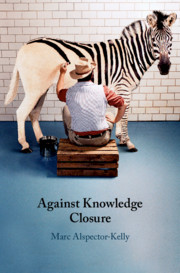Book contents
- Against Knowledge Closure
- Against Knowledge Closure
- Copyright page
- Contents
- Acknowledgments
- Chapter 1 Motivation, Strategy, and Definition
- Chapter 2 Counterexamples
- Chapter 3 Denying Premise 1
- Chapter 4 Denying Premise 2
- Chapter 5 Transmission, Skepticism, and Conditions of Warrant
- Chapter 6 Front-Loading
- Chapter 7 Denying Premise 3
- Chapter 8 Denying Premise 4
- Chapter 9 Denying Premise 5
- Chapter 10 Abominable Conjunctions, Contextualism, and the Spreading Problem
- Chapter 11 Bootstrapping, Epistemic Circularity, and Justification Closure
- References
- Index
Chapter 3 - Denying Premise 1
Skepticism
Published online by Cambridge University Press: 04 May 2019
- Against Knowledge Closure
- Against Knowledge Closure
- Copyright page
- Contents
- Acknowledgments
- Chapter 1 Motivation, Strategy, and Definition
- Chapter 2 Counterexamples
- Chapter 3 Denying Premise 1
- Chapter 4 Denying Premise 2
- Chapter 5 Transmission, Skepticism, and Conditions of Warrant
- Chapter 6 Front-Loading
- Chapter 7 Denying Premise 3
- Chapter 8 Denying Premise 4
- Chapter 9 Denying Premise 5
- Chapter 10 Abominable Conjunctions, Contextualism, and the Spreading Problem
- Chapter 11 Bootstrapping, Epistemic Circularity, and Justification Closure
- References
- Index
Summary
- Type
- Chapter
- Information
- Against Knowledge Closure , pp. 32 - 56Publisher: Cambridge University PressPrint publication year: 2019



